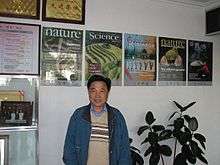Yang Huanming

Yang Huanming (Chinese: 杨焕明; born 6 October 1952), also known as Henry Yang, is one of China's leading genetics researchers. He is Chairman and co-founder of the Beijing Genomics Institute, formerly of the Chinese Academy of Sciences. Yang received his B. Sc from Hangzhou University (now part of Zhejiang University) in 1978, followed by a master's degree in biology in 1982 from the Nanjing Railroad Medical Institute (now Southeast University). Yang earned his Ph.D in 1988 in the Institute of Medical Genetics University of Copenhagen, Denmark. He then completed his post-doctoral training in Europe (at CIML, INSERM/CNRS, Marseille, France, 1988–90) and the United States (at Harvard Medical School and UCLA, 1990–94). He was elected as member of the Chinese Academy of Sciences in 2007, a foreign academician of Indian National Science Academy in 2009, a member of the German National Academy of Sciences in 2012, and foreign associate of the US National Academy of Science in 2014.
Research
Yang's work include the mapping and cloning of human genes, the sequencing and analysis of the human genome, human genome diversity and evolution, and the ethical, legal, and social issues related to genome research. The study of Yang and his collaborators at the Beijing Genomics Institute on the rice genome made the cover of the April 5, 2002 issue of Science magazine. Yang led a 2000 UNESCO sponsored symposium held in Hangzhou on research ethics that focused on some questionable research projects by foreign researchers in Anhui Province and on strengthening the protection of human research subjects in China.
Yang led China's participation in the international Human Genome Project. Yang is a member of the Chinese Academy of Sciences. He was also Coordinator-in-China of the International HapMap Consortium and Chief Coordinator of the Chinese Hybrid Rice Genome Consortium. Yang is Secretary-General of the Chinese Human Genome Project (CHGP), Secretary-General of the Human Genome Diversity Committee, and Secretary-General of the Committee of Ethical, Legal, and Social Issues (ELSI), CHGP. He is a member of the Expert Panel of the National Office for Administration on Genetic Materials, and the Expert Committee of Field of Life Sciences, National Programs on High-tech (“863”), China.
Yang is also a member of Collegium International, an organization of leaders with political, scientific, and ethical expertise whose goal is to provide new approaches in overcoming the obstacles in the way of a peaceful, socially just and an economically sustainable world.
Personal life
Beijing Genomics Institute
Yang leads an institute that has a dual public-private nature since it first established with the help of Wenzhou businesspeople as the Huada Genomics Research Institute (or Beijing Genomics Institute in English) and then later received Chinese government support as the Beijing Genomics Institute of the Chinese Academy of Sciences. Unusual for an institute of the Chinese Academy of Sciences, 80% of the 500 research positions at the BGI laboratories in Beijing and Hangzhou was supported through competitive grants from both Chinese and foreign sources. In 2007 BGI split from the Chinese Academy of Sciences and moved their headquarters to Shenzhen as the first citizen-managed, non-profit research institution in China.
External links
- Nikkei Asia Prize Winners 2003: Yang Huanming "Work in genomics could help end world hunger"
- September 2005 Xinhua press service story on how Yang Huanming organized Chinese participation in the international human genome project.
- Beijing Genomics Institute, Chinese Academy of Sciences
- Huada Genomics Institute of Hangzhou (in Chinese)